|

|

|

|

|

|
|
Friday,
March 10, 2006
 Deregulate
Schooling
- If
one were to keep a file on all the inane things that happen in the arena of
public education, it would quickly consume any space you had. So,
instead, it is just a topic that I come back to on an irregular basis.
What boggles my mind is why there isn't more widespread support for
deregulating education. And, that would include support from across the
political spectrum. I do understand why (most of) the participants in
the education scam oppose deregulation, since they are unlikely to earn
equivalent incomes in a truly competitive environment. But there are so
many examples that come up, which should resonate among the electorate, that I
am still pondering why it is such a difficult row to hoe. Deregulate
Schooling
- If
one were to keep a file on all the inane things that happen in the arena of
public education, it would quickly consume any space you had. So,
instead, it is just a topic that I come back to on an irregular basis.
What boggles my mind is why there isn't more widespread support for
deregulating education. And, that would include support from across the
political spectrum. I do understand why (most of) the participants in
the education scam oppose deregulation, since they are unlikely to earn
equivalent incomes in a truly competitive environment. But there are so
many examples that come up, which should resonate among the electorate, that I
am still pondering why it is such a difficult row to hoe.
 Item:
Teacher in Colorado has outburst
comparing Bush to Hitler and may be back in class next week.
Item:
Teacher in Colorado has outburst
comparing Bush to Hitler and may be back in class next week.
 Item:
Local Flagstaff "peace" activists protest the use of public funds to
pay for JROTC instructors. They call for funding of classes that are the
opposite of the JROTC classes. [This turns out to be an odd issue, since
the classes in question are, primarily, devoted to leadership; is the opposite
... activist?]
Item:
Local Flagstaff "peace" activists protest the use of public funds to
pay for JROTC instructors. They call for funding of classes that are the
opposite of the JROTC classes. [This turns out to be an odd issue, since
the classes in question are, primarily, devoted to leadership; is the opposite
... activist?]
Update
- KJ reader Dan opines, "The opposite of a JROTC course would be a class that teaches
conformity, follower- ship, slovenly appearance, sullen attitudes, disrespect for authority, laziness, and ignorance of history. So really,
most high school classes already are the opposite."
 Item:
Two students expelled from charter school in
Flagstaff have enrolled in public school because it is their "right," says
the Superintendent of the public school system.
Item:
Two students expelled from charter school in
Flagstaff have enrolled in public school because it is their "right," says
the Superintendent of the public school system.
 Item:
A bill in the Arizona State Legislature is
narrowly defeated that would have allowed for students to opt out of reading
"offensive" material as part of their classroom assignments.
Item:
A bill in the Arizona State Legislature is
narrowly defeated that would have allowed for students to opt out of reading
"offensive" material as part of their classroom assignments.
 Item:
A public school bus rolls over on the highway,
outside of Flagstaff (a few years ago). It is an accident, but the
school district must pay suing families, and those payments are acquired
through higher property taxes. So, as a taxpayer, I become financially
liable for accidents that occur in the public school!
Item:
A public school bus rolls over on the highway,
outside of Flagstaff (a few years ago). It is an accident, but the
school district must pay suing families, and those payments are acquired
through higher property taxes. So, as a taxpayer, I become financially
liable for accidents that occur in the public school!
These, and other, issues keep coming up and the solution seems
painfully simple. First,
eliminate
the requirement of compulsory education.
Most, if not all, parents want their children educated. The
benefits from education primarily fall to those being educated, and
their immediate family. Indeed, the United States,
historically, has had a very highly literate population, even before
it was mandatory. [For a really excellent essay on this topic,
read Thomas Lehman's
"Government Schooling: The Bureaucratization of the Mind."]
Second,
eliminate
the government's practical monopoly on education.
The system is bloated and constrained from achieving what, I believe,
we all want - educated individuals. Additionally, the system has
become increasingly centralized, with large schools warehousing
students in an environment that is more likely to be anti-education
than supportive of it. Just today, we have received a few inches
of snow (finally) and the schools are on a two hour delay. But,
regular business offices are not on two hour delays. The
disruption that this causes to families of school children is
substantial, and the reason boils down to the unsafe driving
conditions for school buses. If the schools were deregulated, I
would expect a re-emergence of the neighborhood school, where, even in
a driving snowstorm, students could walk to school. But,
government control of education has increasingly centralized schools
which, fundamentally, works against its supposed mission of educating
students. [In reality, the educational establishment is much
more focused on the incomes of its members than on the education of
its customers.]
Who should support these steps? Well, all of the vested
interests that figure into my "items" above. If you
want a "peace studies" curriculum, start your own
school. If you prefer the JROTC, send your children to that
school. If you have children that can't behave themselves in
school, their families will have to take care of them, not the
taxpayer. If you find certain curriculum's offensive, don't send
your children to that school. The marketplace will provide a
rich and varied landscape from which to choose. And, it (the
market) will do a better job, since students that are graduated from a
school without having really learned anything, will certainly find
that its customers disappear.
|
|

|
|
Saturday,
March 11, 2006
 A
Bennish on NAU
- The
high school teacher, in Denver, Colorado, that was temporarily
suspended for a classroom
outburst when he compared President Bush to Adolf Hitler, has
local roots. The teacher, Jay Bennish, is a graduate of NAU's
College of Education. A reporter at the Rocky Mountain News
tracked down one of Bennish's NAU college professors, Dr. Peggy
Raines, who called her former student, "top-flight."
She is also quoted as saying that,
"I fear he may have got some of that left-wing orientation from
me."
If, by "left-wing orientation" she means "factually incorrect"
and "lacking logic" and "absent rational
reasoning" then I guess she has done a good job. A
Bennish on NAU
- The
high school teacher, in Denver, Colorado, that was temporarily
suspended for a classroom
outburst when he compared President Bush to Adolf Hitler, has
local roots. The teacher, Jay Bennish, is a graduate of NAU's
College of Education. A reporter at the Rocky Mountain News
tracked down one of Bennish's NAU college professors, Dr. Peggy
Raines, who called her former student, "top-flight."
She is also quoted as saying that,
"I fear he may have got some of that left-wing orientation from
me."
If, by "left-wing orientation" she means "factually incorrect"
and "lacking logic" and "absent rational
reasoning" then I guess she has done a good job.
Bennish's 20 minute tirade, taped by one of his
students, was transcribed by Michelle Malkin. You can read Malkin's transcript for yourself, but
there are two portions I wish to comment on, neither of which relate
to the Bush-as-Hitler brohaha. The first is when Bennish asks,
rhetorically,
"Who is probably the single most violent nation on planet Earth?!"
He replies,
"The United States of America!"
Keep in
mind that this comes from a geography teacher, whom you think would
actually have some expertise in this area. And, you'd think he
would know better. But, being a graduate on NAU's College of
Education, perhaps it would be unfair for anyone to hold him to such a
high standard. After all, he was a "top-flight"
student. His diatribe doesn't offer any justification for such a
statement beyond noting our capability for creating weapons of mass
destruction. Yes, we do have plenty. And, we have a
"no first strike" policy on their use, which, I, for one,
think is a mistake. But that doesn't prove anything, unless we
suspend the rules of logic and adopt Michael Moore-ish reasoning
standards.
How can one claim that the U.S. is the "most
violent?" Are we more violent than the repressive regime in North
Korea, which keeps its citizens hostage to a bankrupt philosophy even
if they are starving to death? Are we more violent than those in
Rwanda, when
hundreds of thousands of Tutsis were hacked to death by Hutus
militias? What of the current carnage in Dafur - is that less
"violent" than the U.S.? Or, the past
carnage in Pol Pot's Cambodia? Or, in Biafra? Or, in Idi
Amin's Uganda? Or, in
Stalin's Soviet Union? And, I haven't even gotten to Hitler
yet! And, if we are so violent and so awful, why do so many
people want to come here? Especially when they come here at the risk of death,
whether by dehydration in the Southwest deserts, or capsizing at sea
in vessels that can only be loosely referred to as boats?
A second comment I would make concerns Bennish's views on
capitalism. From the transcript:
| Capitalism
... [is] ... the economic system ... in which all or most of the means of
production ... are owned privately and operated in a somewhat competitive environment for the purpose of producing PROFIT!
... Do you see how when, you know, when you're looking at this definition, where does it say anything about capitalism is an economic system that will provide everyone in the world with the basic needs that they need? Is that a part of this system? Do you see how this economic system is at odds with humanity? At odds with caring and compassion? It's at odds with human rights. |
Clearly, Bennish doesn't have a clue about what role profit plays in a
market economy. Since he is a geography teacher, one may assume
that economics is not his strong suit to begin with. But, the
viewpoint expressed above is an indication that basic understanding of
markets isn't even his short suit. Profits provide incentives
for people to work together to produce goods that other people
desire. That is likely to be light years more effective than
relying on the "caring and compassion" of others to see to
your wants and desires. Indeed, unless Bennish is claiming that
we should become some strict religiously-dominated society where God
will take care of us, there is no such economic system that can
guarantee people get their "basic needs." There is
only freedom and liberty on the one side, and coercion and slavery on
the other. Is Bennish arguing that collectivism, which relies on
force to accomplish its goals, is compatible with "human
rights?" So it would seem. It sounds eerily like
George Orwell!
Bennish certainly has learned his teaching style at NAU - lecture by
diatribe, reasoning by assertion and the irrelevancy of facts.
I'm glad that this hasn't transferred well into the public high school
where he is currently teaching. Yes, Jay Bennish may have been a
"top-flight" student in the College of Education. That
doesn't surprise me, nor does it impress me. When Professor
Raines says that,
"I just think it's a shame that the conservative right-wingers can try to dictate curriculum,"
with regard to Bennish's suspension, then I can't help but wonder if
the whole College of Education isn't just rotten to the core.
|
|

|
|
Monday,
March 13, 2006

Panorama of Grand
Canyon buttes from the Tonto Trail near Cottonwood Creek. Click
to see a larger image.
 The
Old Grandview Trail
- Well, it was bound to happen some time this winter - snow in
Flagstaff. According The
Old Grandview Trail
- Well, it was bound to happen some time this winter - snow in
Flagstaff. According
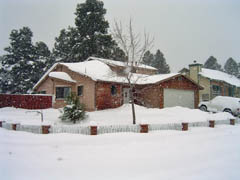 to
one of the Phoenix TV channels, we got some 28 inches over the last
three days. It seems to me that's about a quarter, or more, of
our annual average. Until now, we only had a sprinkling of snow
twice, and I
posted up a
photo of the second snowfall, which hardly lasted 24 hours.
This one was big, and my back can attest to that! So, my flurry
of Grand Canyon hiking may be at an end for a while. So it
goes. It was sure nice while it lasted - nice temperatures and
easy access to trails away from the main corridor. So, it is an
opportune time to blog about my last hike, which was just a week ago,
down the Grandview Trail, which is some 12 miles east of the main
South Rim Village at the Grand Canyon. to
one of the Phoenix TV channels, we got some 28 inches over the last
three days. It seems to me that's about a quarter, or more, of
our annual average. Until now, we only had a sprinkling of snow
twice, and I
posted up a
photo of the second snowfall, which hardly lasted 24 hours.
This one was big, and my back can attest to that! So, my flurry
of Grand Canyon hiking may be at an end for a while. So it
goes. It was sure nice while it lasted - nice temperatures and
easy access to trails away from the main corridor. So, it is an
opportune time to blog about my last hike, which was just a week ago,
down the Grandview Trail, which is some 12 miles east of the main
South Rim Village at the Grand Canyon.
This is a hike I have wanted to do for
many years. But, my interest was especially piqued by volume 6
of Burton
Holmes' Travelogues,
published in 1910, which I acquired from 5
Quail Books. About a third of the volume relates to the
Grand Canyon and it is loaded with pictures. I found one that
was titled, "At the foot of the Grand View Trail."
Years ago, in Harvey Butchart's journals,
I read of his attempt to find the old trail, leading off the Tonto
Plateau and following it to the river. He remarked that there
wasn't much room to wander about at the river, but that he was able to
match the area up with photos from an old book. There is a photo
in George Warton James' The
Grand Canyon of Arizona
(also 1910, and one of my all time favorites), and I thought that was
the photo he used. But, that photo is dark and there is precious
little detail to use in matching up that this is the right spot.
Well, Holmes' photo is much better, and there is quite a lot in the
foreground that one can use in discerning the exact location of this
spot. And, as I realized that this was the photo that Butchart
must have been using, I wanted to check this route out.
Again. The first time was in 1984. Halfway down the Vishnu
Schist I was sure I had gotten off the trail, but I did make it to the
river. Since then, I have been convinced that I missed the real
route, and this would be my opportunity.
To read about this hike and see photos (including ones from Holmes and
James), click on this link: Following
the Old Grandview to the Colorado River.
|
|

|
|
Wednesday,
March 22, 2006
 From
To the Mouth of Babes
- The Arizona State Legislature is well on its way to striking
down breast feeding as punishable under public indecency codes.
The issue first came up in Chandler and Tempe last year, and has since
gained traction with the legislature. So far, excluding breast
feeding as indecent exposure doesn't seem especially
controversial. Indeed, from what I have read, no woman has ever
been cited for a violation. Instead, when the issue comes up,
pleas are made to use discretion and everyone moves along with their
business.
But, proponents have been pushing for city ordinances (including in
Flagstaff) that would expressly allow for breast feeding anywhere the
public is allowed, be it a restaurant, a theater, a grocery store or
the library. Once again, it is the lazy social activist's way of
promoting their agendas. I have no problem if a business owner
seeks to prohibit breast feeding, nor do I have a problem with a
business owner allowing, and even accommodating, such activity.
But, it should not be up to the nursing mother, nor the state.
It should be up to the business owner. Use whatever powers of
persuasion you have to convince businesses to accept this behavior,
but don't use the power of the state to force them into conformity.
When it comes to government-run facilities, this issue reinforces the
notion that we should rely on the market for the provision of goods
and services. There is no compelling rationale for city pools,
nor county libraries, nor state universities. Those are all
examples of users extorting non-users to pay for their
activities. When you want to tax Peter to pay Paul, you can
always count on the support of Paul.
|
|

|
|
Thursday,
March 23, 2006
 Running
for Office, pt. I
- This spring, the citizens of Flagstaff will be voting to fill
three city council seats and the mayoral spot. The local paper,
the Arizona Daily Sun, is allocating weekly editorial space for the
candidates to express their views on various topics. Since there
are only six total candidates, we are likely to get a pretty good idea
of what these candidates are all about. The first topic was
"affordable housing." Unfortunately, the premise of
this topic ignored the fundamental issue about whether this is even an
appropriate role of government. And, equally distressing, most
of the candidates didn't question argue with this premise. Here
is a critique of these candidates on this subject: Running
for Office, pt. I
- This spring, the citizens of Flagstaff will be voting to fill
three city council seats and the mayoral spot. The local paper,
the Arizona Daily Sun, is allocating weekly editorial space for the
candidates to express their views on various topics. Since there
are only six total candidates, we are likely to get a pretty good idea
of what these candidates are all about. The first topic was
"affordable housing." Unfortunately, the premise of
this topic ignored the fundamental issue about whether this is even an
appropriate role of government. And, equally distressing, most
of the candidates didn't question argue with this premise. Here
is a critique of these candidates on this subject:
 Joe Donaldson (mayor; incumbent):
His first comment was, "Major
businesses could purchase land and build housing for their work
force."
Scary stuff, and he is the incumbent! Certainly, there is
nothing to prevent a business from doing this now, but the mayor's
sentiments seem to imply that we should require that this housing be
built. So, what happens if someone gets fired? Do they
have to leave their housing? Then what? Or, will the
business have some kind of life-long commitment to providing these
people with housing regardless of whether they work? This idea
doesn't even merit idle speculation. It is incredible that such
economic naiveté can permeate the government. People with this
mindset don't seem to understand the fundamentals of business and are
far too quick to kill the goose that lays the golden egg, as if there
were an infinite supply of such eggs.
Joe Donaldson (mayor; incumbent):
His first comment was, "Major
businesses could purchase land and build housing for their work
force."
Scary stuff, and he is the incumbent! Certainly, there is
nothing to prevent a business from doing this now, but the mayor's
sentiments seem to imply that we should require that this housing be
built. So, what happens if someone gets fired? Do they
have to leave their housing? Then what? Or, will the
business have some kind of life-long commitment to providing these
people with housing regardless of whether they work? This idea
doesn't even merit idle speculation. It is incredible that such
economic naiveté can permeate the government. People with this
mindset don't seem to understand the fundamentals of business and are
far too quick to kill the goose that lays the golden egg, as if there
were an infinite supply of such eggs.
The mayor
goes on to write that the "solution
lies somewhere between everyone receives a house for free, to everyone
pays full market price."
No, it doesn't. There is no
"solution" that will satisfy affordable housing advocates.
There never will be. There is no outcome, along the spectrum
outlined by the mayor, that won't lead to a host of problems that
will, ultimately, undermine our economic foundations.
 Paul Reilly (mayor; challenger):
Well, Mr. Reilly has no chance of winning this election and I would be
surprised if he even got 10% of the vote. And, since his
campaign is based on being a better liberal than Donaldson, he really
has little, or nothing, to offer. His main point was to "permit"
additional units be build on existing properties, and to "encourage"
that the work be done by local contractors "to
further economic sustainability."
The only thing such a regulation would encourage is higher prices and
a worsening of the this "problem." If we follow Mr.
Reilly's questionable logic to its inevitable conclusion, we should be
making all the workers' tools locally, and providing all of the
building materials locally. Seemingly, that would promote
"sustainability" to an even greater level! And, it
would be creating a wasteland where once a vibrant community
stood. Great plan. Oh yeah, and he wants to double the
property tax on people who own a second home. Well, at least we
won't be goose-stepping to Mr. Reilly's vision of the ideal state any
time soon.
Paul Reilly (mayor; challenger):
Well, Mr. Reilly has no chance of winning this election and I would be
surprised if he even got 10% of the vote. And, since his
campaign is based on being a better liberal than Donaldson, he really
has little, or nothing, to offer. His main point was to "permit"
additional units be build on existing properties, and to "encourage"
that the work be done by local contractors "to
further economic sustainability."
The only thing such a regulation would encourage is higher prices and
a worsening of the this "problem." If we follow Mr.
Reilly's questionable logic to its inevitable conclusion, we should be
making all the workers' tools locally, and providing all of the
building materials locally. Seemingly, that would promote
"sustainability" to an even greater level! And, it
would be creating a wasteland where once a vibrant community
stood. Great plan. Oh yeah, and he wants to double the
property tax on people who own a second home. Well, at least we
won't be goose-stepping to Mr. Reilly's vision of the ideal state any
time soon.
 Joe Haughey (city council; incumbent):
At least Haughey asks, "How
much should City Government become involved?"
I wish that had been the question. Unfortunately, his answer
still seems to be, "plenty." He, and others, are
pushing for a "community land trust." I would wish
that this was a purely private effort, with the city just concerned
with simple rule-making, but that is probably too optimistic.
Joe Haughey (city council; incumbent):
At least Haughey asks, "How
much should City Government become involved?"
I wish that had been the question. Unfortunately, his answer
still seems to be, "plenty." He, and others, are
pushing for a "community land trust." I would wish
that this was a purely private effort, with the city just concerned
with simple rule-making, but that is probably too optimistic.
 Libby Silva (city council; incumbent):
Silva is somewhat erratic when it comes to government, but, often, his
heart seems in the right place. His major proposal calls for
relaxing the city's Land Development Code to allow for more
construction - three cheers for that one!
Libby Silva (city council; incumbent):
Silva is somewhat erratic when it comes to government, but, often, his
heart seems in the right place. His major proposal calls for
relaxing the city's Land Development Code to allow for more
construction - three cheers for that one!
 Scott Overton (city council; challenger):
Overton writes that "Affordable housing in Flagstaff is
possible." Well, that is one strike against him.
Clearly, this "problem" will never be solved, even though
all these candidates imply that with the simple stroke of the pen, we
can overcome this crisis once and forever. I guess that is one
of the reasons why people think politicians lie all the time - because
they do. Overton also mentions tinkering with the development
code, which probably would be a good idea, but, then, he starts
suggesting that the city use "incentives to property owners for
projects that fit the concept of affordable housing." There
are some people that just haven't ever seen a government too big.
Scott Overton (city council; challenger):
Overton writes that "Affordable housing in Flagstaff is
possible." Well, that is one strike against him.
Clearly, this "problem" will never be solved, even though
all these candidates imply that with the simple stroke of the pen, we
can overcome this crisis once and forever. I guess that is one
of the reasons why people think politicians lie all the time - because
they do. Overton also mentions tinkering with the development
code, which probably would be a good idea, but, then, he starts
suggesting that the city use "incentives to property owners for
projects that fit the concept of affordable housing." There
are some people that just haven't ever seen a government too big.
 Rick Swanson (city council; challenger):
Swanson is a former member of the city council. I can only hope
that he stays that way. His is the way of the benevolent
dictator - he knows what we need and is willing to act on that
"knowledge." If we gave him unfettered control of the
city, as a benevolent dictator, I'd predict that this place would turn
into a slum, with correspondingly high crime rates, within two
years. Well, it does take a while for property owners to realize
they have been ... disenfranchised of their wealth. Swanson
touts his efforts at creating a city fund for first time home buyers,
when he was on the council. I'd have more (or, at least, some)
respect for him if he had done this privately, instead of using
taxpayer's money for this purpose.
Rick Swanson (city council; challenger):
Swanson is a former member of the city council. I can only hope
that he stays that way. His is the way of the benevolent
dictator - he knows what we need and is willing to act on that
"knowledge." If we gave him unfettered control of the
city, as a benevolent dictator, I'd predict that this place would turn
into a slum, with correspondingly high crime rates, within two
years. Well, it does take a while for property owners to realize
they have been ... disenfranchised of their wealth. Swanson
touts his efforts at creating a city fund for first time home buyers,
when he was on the council. I'd have more (or, at least, some)
respect for him if he had done this privately, instead of using
taxpayer's money for this purpose.
|
|

|
|
Friday,
March 24, 2006
 Minimum
Wages are Immoral
- This week the Arizona Daily Sun had two editorials in support
of raising the minimum wage - one written by the editor and one from
an author, Holly Sklar. The specific arguments raised in these
editorials are worthy of further commentary, but that will have to
wait for a bit. Still, I did pen a letter to the editor on this
topic, which is as follows: Minimum
Wages are Immoral
- This week the Arizona Daily Sun had two editorials in support
of raising the minimum wage - one written by the editor and one from
an author, Holly Sklar. The specific arguments raised in these
editorials are worthy of further commentary, but that will have to
wait for a bit. Still, I did pen a letter to the editor on this
topic, which is as follows:
|
To
the editor:
When an issue like the minimum wage comes up, won’t someone
cry out, “Fair Liberty, raise thy shield against the demons of
coercion?” Alas, the forces of evil are unrelenting in
their attacks, and the shield of liberty weakens over time.
Without an appreciation for the ideals of freedom, fashioned
into the foundation of our country by the founding fathers, we
find our “life, liberty and pursuit of happiness” is made
ever more difficult.
Is the minimum wage a “moral” issue? Yes. Is it
an “ethical” issue? Absolutely! Where freedom
reigns, if A wants to hire B and they both agree on a wage, what
moral basis can be cited for restricting that voluntary action?
If B believes the wage is not high enough, he will not accept
it. And, if A believes it is too high, he will not offer
it. Voluntary action is not only essential for a
sustainable system, it represents the ultimate in moral and
ethical principles.
There is no worse abuse of our freedoms than to use the coercive
power of government. This is the tactic of the lazy social
activist – force others to comply with their sense of how the
world should work. I would have more (or, at least, some)
sympathy for them if they would channel their efforts into
private efforts to achieve their desired ends. |
|
|

|
|
Saturday,
March 25, 2006
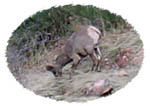  Spring
Break at Plateau Point
- Yesterday, a host of colleagues and guests joined up for a day
hike into the Grand Canyon. We have finally gotten snow
in northern Arizona, so our choices are quite limited. Even
though it has warmed up quite a bit, the north-facing Spring
Break at Plateau Point
- Yesterday, a host of colleagues and guests joined up for a day
hike into the Grand Canyon. We have finally gotten snow
in northern Arizona, so our choices are quite limited. Even
though it has warmed up quite a bit, the north-facing 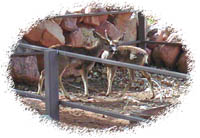 trailheads
along the south rim are snowpacked, icy and slippery. At least
until you get down to
the Coconino cliffs. Then, it turns into mud for a while.
We decided to do a hike to Plateau Point, accessible from the popular
Bright Angel Trail, located right at the South Rim Village. trailheads
along the south rim are snowpacked, icy and slippery. At least
until you get down to
the Coconino cliffs. Then, it turns into mud for a while.
We decided to do a hike to Plateau Point, accessible from the popular
Bright Angel Trail, located right at the South Rim Village.
We got started on the trail at 9:30 a.m., right at the tail end of
three mule trains. There wasn't much traffic on the trail,
insofar as hikers go, nor in terms of mule riders. I'd say that
each mule train had less than ten riders in them. The top of the
 trail
was in pretty good shape, although
there were two long icy stretches. But, the ice was frozen
slush, formed by the passage of boots and mules. Still, it was
nice to have a hiking stick to help maintain my balance. trail
was in pretty good shape, although
there were two long icy stretches. But, the ice was frozen
slush, formed by the passage of boots and mules. Still, it was
nice to have a hiking stick to help maintain my balance.
We were ten for today's hike, and five were on their first hike into
the canyon. The temperature was pleasant at the start - cool,
but not cold. We had rather clear skies, but there was some high
level, wispy, cloudiness that kept the day from being crystal
clear. Along the way we saw some deer at the Indian Garden
campground (4.5 miles down the trail), three bighorn sheep in the
Supai level (about 2.5 miles down) and three condors circling overhead
at Plateau Point (6 miles down). We ate lunch at Plateau Point,
where we are overlooking the Colorado River, which was very muddy
today. The round trip, from the trailhead, lasted between seven
and eight hours, and covered some 12 miles.
| Click
on any picture to see a larger image (including the bighorn,
deer and helicopter). |
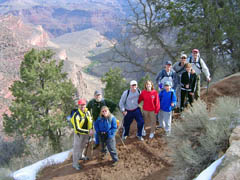 |
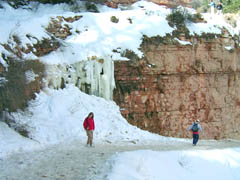 |
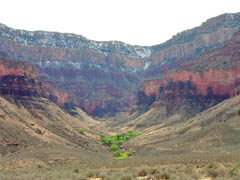
|
|
Starting near
Kolb Studio - John, Joe, Susan, Russ, Tamara, Russell, David,
Jason, Carly and Dennis |
Tamara and Russ
pass by the frozen Kolb Seep, about one mile down the Bright
Angel Trail. |
Looking
back toward Indian Garden, the South Rim and the Bright Angel
fault line from Plateau Point.
|
|
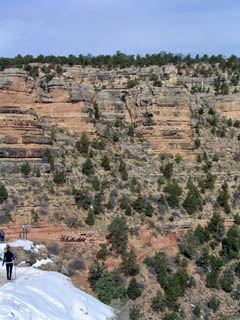
From near the
trailhead, we can see some snowy and icy stretches of the
trail, and a mule train getting everyone into final shape for
their ride down to Plateau Point.
|
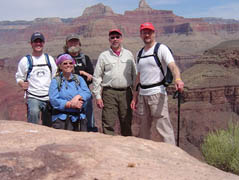
The last of us
to leave from P.P.
|
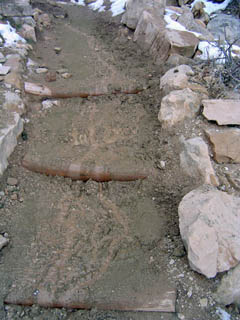
While
stretches of the trail were icy on the way down, on the way
back up, there was often a steady trickle of water flowing
over the trail. But, the trail was draining well.
|
|
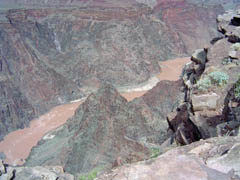
The Colorado
River from P.P.
|
One event, that everyone in the area
noticed, was a low flying helicopter. As we were heading back
from Plateau Point, toward Indian Garden, I heard it and then saw
it, flying below the rim, not too far west of us. It headed
north and disappeared behind some buttes on the other side of the
river. Since this airspace is not used for commercial
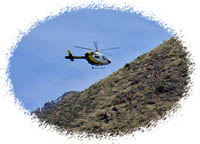 tours,
I suspected it was a Park Service helicopter. As it got close, I
could see that, in fact, it was one belonging to the NPS. It
turned around, and flew back south, disappearing around the ridge from
me, and landing at Indian Garden! It was probably stopped there
no more than five minutes, before lifting off and flying by us
again. There wasn't anybody at Indian Garden that could tell me
what happened, but it didn't seem to be related to any medical
emergency (at least, not at Indian Garden). tours,
I suspected it was a Park Service helicopter. As it got close, I
could see that, in fact, it was one belonging to the NPS. It
turned around, and flew back south, disappearing around the ridge from
me, and landing at Indian Garden! It was probably stopped there
no more than five minutes, before lifting off and flying by us
again. There wasn't anybody at Indian Garden that could tell me
what happened, but it didn't seem to be related to any medical
emergency (at least, not at Indian Garden).
Well, this illustrates the park's paradoxical (or, hypocritical)
stance on "unnatural noise." It doesn't apply to any
noise they cause, only to noise caused by others. [Additionally,
there was a trail crew at work today, on upper sections of the trail;
early on, I did hear the sound of some machinery they were using in
their work - also not included as "unnatural noise."]
I don't have any special problem with the noise, but I do resent the
"holier-than-thou" attitude of park officials when it comes
to this issue. And, while I knew it was a park service
helicopter, how many complaints will they get from other visitors who
didn't know? And, will those complaints be assumed to refer to
commercial helicopters? It seems to me that this certainly can
be the case.
Related
post: Noisy
Grand Canyon?
|
|

|
|
Monday,
March 27, 2006
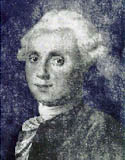  Messier
'O Stars
- In
the mid-to-late 1700s, Charles Messier, an amateur astronomer in
France, was hunting down comets. He was frustrated by sightings
of "fuzzy objects" that resembled comets, but did not move
across the night sky. To keep from being distracted by these
unknown objects he started to chart them and compiled a catalogue of
their positions. [He wasn't the first to see these objects, and
he included objects that had been noted by others.] He ended up
with around 100 objects, and a few more were added in later, based on
his notes. One object (102) is a repeat of another (101), and
contemporary astronomers substitute a different object for this
one. Yes, the Messier list is messy business. Today, the
standard list is 110 objects, that span the sky. [Click image,
to the right, to read more on Messier.] Messier
'O Stars
- In
the mid-to-late 1700s, Charles Messier, an amateur astronomer in
France, was hunting down comets. He was frustrated by sightings
of "fuzzy objects" that resembled comets, but did not move
across the night sky. To keep from being distracted by these
unknown objects he started to chart them and compiled a catalogue of
their positions. [He wasn't the first to see these objects, and
he included objects that had been noted by others.] He ended up
with around 100 objects, and a few more were added in later, based on
his notes. One object (102) is a repeat of another (101), and
contemporary astronomers substitute a different object for this
one. Yes, the Messier list is messy business. Today, the
standard list is 110 objects, that span the sky. [Click image,
to the right, to read more on Messier.]
Once a year, in the early spring, conditions are just right for an
attempt to see all 110 objects in one night. You need a dark
sky, a clear sky, a moon that is at/near its new stage, and the
stamina to stay up (practically) all night long hunting down these
objects. Well, that is the old school way to do this.
These days, most serious amateurs have "goto" telescopes,
which have computers that store data and can position the telescope on
any desired object. Mine, an 8
inch Meade LX-200 GPS also has a GPS unit that aligns itself when
I fire it up, figuring out where it is, which is necessary if it is to
locate objects in the sky.
This year, there are a couple of weekend opportunities for doing, and
finishing, a Messier Marathon - this past weekend of the 25th and 26th
of March, and next weekend, the 1st and 2nd of April. Last year,
I joined up with the Sirius
Lookers, of Sedona, for my
first marathon. In the wee hours of the night, it was not only
bitterly cold, but everything was getting soaked from the humid air.
Living in northern Arizona, I'm afraid that I take dry air for
granted!
So, I was thinking about doing this marathon with the astronomy clubs
down in Phoenix and Tucson. It will still be cold overnight, but
not like up in Sedona or Flagstaff. The biggest problem they
face is the enormous reach of the city lights. They use a site
about 60 miles south of Phoenix, within sight of the Kitt
Peak Observatory, located atop some mountains to the south.
While there is a low-lying dome of light to the north (Phoenix) and a
smaller one to the east (Tucson), it has great views of the night
sky. Additionally, the weather had taken a turn, and there was
quite a bit of cloudiness in northern Arizona, and, as of Saturday
afternoon, southern Arizona would be out from under cloudy
skies. So, it was off to this site, dubbed Arizona
City. [continued below]
We were four on this venture - Sue, Tom, Eric
and me. We took two vehicles, as my telescope and tripod fill up
the back of my pick-up. It took us a bit over four hours to
drive down to this site from Flagstaff. We had directions, and a
map, from the web posting by the Saguaro
Astronomy Club. However, upon closer inspection, the map and
the directions were not consistent with one another. And, to
make things worse, there was not a single sign directing us to the
site. We found ourselves at the end of a dirt road as dusk
befell us, wondering what to do. Another vehicle came up behind
us, but he was also lost. We all backtracked and came across
three more vehicles, and one of them knew where the site was. We
were actually very close - less than a quarter of mile away - but the
site is well screened. We drove past some brush and were treated
to the sight of probably 100 vehicles scattered about the desert, with
telescopes all set up and ready to go.
We were able to quickly set up, so that we could start viewing as soon
as conditions permitted. There were clouds to the north that
really reflected the lights of Phoenix, and some to the
northwest. These latter clouds prevented us from seeing five
objects - M31, M32, M33, M74 and M110 (all are galaxies) before they
set. So it goes. It is a funny event, in that most of the
participants are focused on the task of seeing these objects.
So, there isn't really much socializing that goes on, except, maybe
with the folks right around you. We did have a few passersby
stop and chat. One guy, who travels out here from California
every year for this event, had seen M74, but it was just during a very
brief break in the clouds.
I had two lists of the Messier
objects with me, that show them in an order that is easy to follow.
That is, you really start with objects in the western sky, since
they will be soon setting, and move your way across the sky to the
east. Usually, the order follows a route that is easy for a
manual hunt for these objects. But, with the a computer-driven
scope, all I have to do is punch in the number and let the computer
do the rest. [Last year, in Sedona, the guy next to me was
doing a manual hunt and looking at these objects with a pair of
binoculars on a tripod. He was good and only missed seeing
three, or four, objects.]
Well, with patchy clouds interfering with our observing, we opted to
look at blocks of objects, either off the lists (and, out of order),
or from a chart I carry with me. So, if it was clear near the
Big Dipper, we would knock off the M's there (40, 51, 63, 94, 101,
106, 108 and 109). And, so it went over the course of the
night. Although Tom was feeling poorly, and turned in, Sue, Eric
and I were a Messier-viewing machine, sharing duties of announcing the
next object, punching the data into the controls, centering the object
and checking it off the list. By 12:30 p.m. we were quite tired
and looking forward to our scheduled nap! At that point, you
have pretty much reached the eastern horizon, so you can stop for a
couple of hours.
We had some really great sights this evening. The Great Nebula
in Orion (M42) was awesome, as usual, and even Tom got to see this
one. We could see some structure in many of the spiral galaxies. The Sombrero Galaxy (M104) was
especially spectacular,
as we had a great view of the dark edge that crosses along the plane
of that galaxy. And, the black eye in the Black Eye Galaxy (M64)
was quite visible. We ended our run with M13 - the Hercules
globular cluster. It was one of the night's highlights. It
looked even better than the image, below, that I borrowed from
NASA. We left that one on scope during our snooze, and it was
still tracking perfectly two hours later - what a great telescope!
Around 2:30 a.m., I got up and started putzing around. It was
cold, but not bitter. I had on my fleece jacket and nylon shell
and felt fine. Well, I also had on earmuffs and wore lightweight
gloves. Sue was up soon after me, but Eric was down for the
count, not to rise until the sun did!. The skies were very clear
at this time, but it didn't take long until we were back to our
pattern of searching areas that were open and keeping an eye on what
parts were clouded over. We had lots of globular clusters and
open clusters in the early morning and they looked great. We
especially were awed by the Ring Nebula (M57), the Lagoon Nebula (M8)
and the Swan Nebula (M17, aka the Omega Nebula). It was quite
cool to be viewing a globular cluster when the wispy clouds would
cover it up, and, then, blow away to reveal these objects. It was actually
enhancing our appreciation for these features - "Still
cloudy. Now, it is getting better. OK, I can see
something. I can ... Oh, that is great - quick, come and
see this one." [continued
below]
| Click
on any picture to see a larger image. |
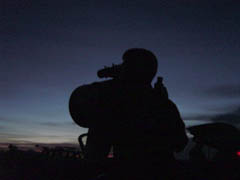 |
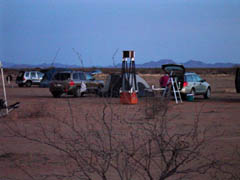 |
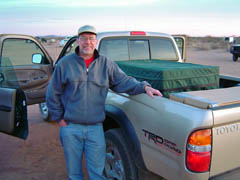
|
|
Nighttime
observing. |
Just a few of
the many scopes. |
All
packed up for the return home.
|
We also
got to see Saturn (during the evening run), Jupiter, Venus, Mercury
and a nice thin crescent moon. On Jupiter we could easily see
the two main dark cloud bands, but could also see fainter bands
nearer the top and bottom of the planet, along with four of its
moons. Mercury was quite a treat, as it is hard to see anyway.
But, it is just about as far away from the sun (from our
perspective) as it ever gets, so it was nice to pick it up, at about
5 a.m. and track it for a while at the end of our observing.
We played hide and seek with the last few objects on our list - M70,
M54, M55, M75, M15, M2, M72 and M73. We visited each of these at
least a half dozen times before seeing them. We started watching
for openings in these sections of the sky, and would hurry over to see
if they were visible. For a while, it looked like we wouldn't
catch the last three, but we got them! The only early object we
didn't get was M30 - the skies were clear, but they were just too
bright to make this cluster visible. Well, so it goes.
So, for the night, I got 104 objects and Sue got 103. She missed
the Little Dumbbell (M76) at the outset of our viewing. I only
got it because I was looking during a quick break in the clouds.
Eric got 64 objects, while Tom was only able to see eight before
packing it in. This was the second marathon for Eric and me, so
Sue got a great score for the first one. Later this week I am
going to try to see the M's we missed, so I can say that I did see
them all this year, even if not in one night.
|
Images
from NASA's "Astronomy Picture of the Day."
Click on any image for the photo/story/credits at NASA site. |
 |
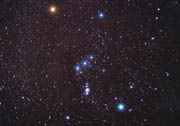 |
 |
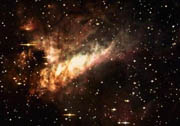 |
|
The
Hercules Cluster - M13 |
The
Orion Constellation |
Sombrero
Galaxy - M104 |
The
Swan Nebula - M17 |
|
|

|
|
Thursday,
March 30, 2006
 Club
Gitmo - Where Spring Break Never Ends
- Lots to blog about ... later. But, for a break in the
action, for your entertainment pleasure, click on the image, below, to
go to Metrospy's spoof on the dancing baby of years ago. The
site is a retail outlet for t-shirts, caps, et al., but, clearly, they
enjoy playing the role of social critic. Club
Gitmo - Where Spring Break Never Ends
- Lots to blog about ... later. But, for a break in the
action, for your entertainment pleasure, click on the image, below, to
go to Metrospy's spoof on the dancing baby of years ago. The
site is a retail outlet for t-shirts, caps, et al., but, clearly, they
enjoy playing the role of social critic.

|
|

|

|

|

|

|